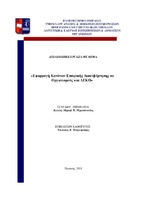Εφαρμογή κανόνων εταιρικής διακυβέρνησης σε οργανισμούς και ΔΕΚΟ

Master Thesis
Συγγραφέας
Μιχαλόπουλος, Άγγελος Μιχαήλ
Ημερομηνία
2018-11Επιβλέπων
Τσαγκαράκης, ΝικόλαοςΠροβολή/
Λέξεις κλειδιά
Λογιστική επιστήμη ; Έλεγχος ; Εσωτερικός έλεγχος ; Εταιρική διακυβέρνηση ; Κώδικας εταιρικής διακυβέρνησηςΠερίληψη
Η ανάγκη για την συνεχή παρακολούθηση της λογιστικής πληροφόρησης αποτελεί ένα καθημερινό -δύσκολο- έργο της σύγχρονης οικονομίας. Η Λογιστική Επιστήμη έχει ξεπεράσει προ πολλού την απλή αποτύπωση αριθμών και έχει καταστεί σε ένα σημαντικό κομμάτι της καθημερινότητας των πολιτών, το οποίο διέπει την αυτοσυντήρηση, την αυτονομία και την αυτάρκεια τους.
Η λογιστική αποτελεί το εργαλείο με το οποίο μπορεί κάποιος να μετρήσει τις οικονομικές τους δυνατότητες. Οι δυνατότητες αυτές στηρίζονται σε αριθμούς οι οποίοι δημιουργούν την πηγαία ανάγκη του ανθρώπου για κατανάλωση και επενδύσεις με σκοπό την καλύτερη απόδοση των χρημάτων τους. Οι ανάγκες των ανθρώπων και η προσπάθεια τους για μεγιστοποίηση των κερδών τους, οδήγησε στην ανάγκη για έλεγχο των οικονομικών πληροφορίων.
Ο έλεγχος αποτελεί ένα αναπόσπαστο κομμάτι της λογιστικής παρακολούθησης και πληροφόρησης. Ο έλεγχος είναι μια διαδικασία εξαγωγής συμπερασμάτων, ο οποίος προκύπτει μέσα από την συνεχή παρακολούθηση των οικονομικών καταστάσεων μια επιχείρησης και αποτελεί το βασικό εκείνο στοιχείο για την ορθή επιλογή της αύξησης των κερδών τόσο της επιχείρησης όσο και όλων των ενδιαφερομένων μερών.
Ο έλεγχος έχει καταστεί σήμερα μία απαραίτητη διαδικασία, η οποία βασίζεται σε δικλείδες ασφαλείας, οι οποίες ενεργοποιούνται, όταν παρουσιάζεται ένα πρόβλημα, με σκοπό τόσο την αντιμετώπισή του, όσο και την επίλυση του, προτού καταστεί επιζήμιο.
Η διεθνοποίηση των συναλλαγών, η εμφάνιση πολλών σκανδάλων τα τελευταία έτη, καθώς και η παγκόσμια οικονομική κρίση έχουν αποτελέσει τους πυλώνες για την εφαρμογή μιας κοινής πολιτικής παρακολούθησης και ελέγχου των οικονομικών μονάδων. Η προσπάθεια για τον εκσυγχρονισμό της λογιστικής επιστήμης έχει καταστεί παραπάνω από επαρκής τα τελευταία χρόνια, τόσο με την υιοθέτηση των Διεθνών Προτύπων Χρηματοοικονομικής Αναφοράς(ΔΠΧΑ), όσο και με την εφαρμογή των Διεθνών Προτύπων Ελέγχου (ΔΠΕ).
Στα πλαίσια αυτά, τόσο σε εθνικό επίπεδο, όσο και σε παγκόσμιο, οι εταιρείες οι οποίες είναι εισηγμένες στα Χρηματιστήρια Αξιών, υποχρεώνονται στην εφαρμογή κανόνων και αξιών, που θα διέπουν όχι μόνο την οικονομική τους πολιτική, αλλά και την στρατηγική τους, με σεβασμό στην κοινωνία και τα ενδιαφερόμενα μέρη τους.
Η Εταιρική Διακυβέρνηση αποτελεί ένα εργαλείο το οποίο συντελεί στην επίτευξη του ορθού ελέγχου, αφού αποτελεί βασικό πυρήνα του εσωτερικού ελέγχου της επιχείρησης και της προσπάθειας για την βιωσιμότητα και αειφόρο ανάπτυξή της, αλλά και στην αποδοχή των επιχειρήσεων από το κοινό.
Τέλος, αξίζει να λεχθεί ότι η πιστή εφαρμογή ενός κώδικα εταιρικής διακυβέρνησης συνυφασμένος τόσο με την οικονομική, όσο και την κοινωνική πλευρά των επιχειρήσεων, μπορεί να καταστεί μοχλός βελτίωσης και επιτυχιών για τους οργανισμούς.


